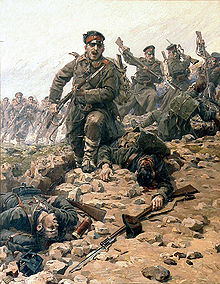Shumi Maritsa
The original text was written by Nikola Zhivkov, a head teacher in Veles (now in North Macedonia).
[5] Nikola Zhivkov created the lyrics of the song when he was among the Bulgarian volunteers who participated in the Serbian-Turkish war that broke out in 1876.
He created the song because of his admiration to the personality and charisma of General Mikhail Chernyayev, who commands the Bulgarian volunteers.
His rhythm text, which does not always correspond to the music of a march, connects unlucky poems, and these flaws unpleasantly annoy the ear and taste of the singing of 'Shumi Maritza'.
With the ubiquitous admiration that today's warfare arouses on this march, its textual corrections have become imperative to have the world in the mood of its kind.Another minor revision was done in 1914.
[4] According to the newspaper "Fatherland Front", the Botev celebrations in Bulgaria was opened on 2 June 1947 with "Maritza Rushes".
[9] During the discussion for the new constitution of Bulgaria in the 7th Grand National Assembly, there are some proposals submitted for a new anthem.
The most popular proposal include the readoption of "Maritza Rushes" as the national anthem of Bulgaria.
The military orchestra constantly plays the anthem during the battle, even when their instruments are shot by enemy bullets and broken by grenades.
[12] During the Second Battle of Shipka Pass in the Russo-Turkish War, the Russian command saw that the spiked position couldn't be held back any more.
Without a fight, in the performance of "Maritza Rushes", the Danube Regiment quickly climbed on a steep cliff.
[13] On 16 October 1912, at Karaağaç, the commander of the 18th King Ferdinand I regiment, Lieutenant Colonel Antonov saw the advancing Turkish infantry battalions.
He took over the regal shrine and with a sword taken out, under the anthem's lyrics performed by the regimental brass band, he led the attack of his army.
The attacking forces of the Turkish Army were dismissed, and the regiment's advance and division continued with complete success.
[13] On the night of 12 March 1913, the commander of the 23rd "Shipka" Infantry Regiment received the task of storming the Ayvaz Baba, a fort in the eastern sector of the Edirne defence.
The regiment commander, Colonel Ivan Pashinov, judged that he would not be able to pass the wire barriers on the fortress.
[13] During the Second Balkan War in the summer of 1913, when the Modra Wall (Serbia) attacked, the 34th "Trojan" Infantry Regiment, headed by its captain, found itself behind the right wing of the Serbs.
The Captainmaster raises his subordinates and the boxing music starts playing "Shumi Maritza".
Of the captured prisoners, it is understood that against the Bulgarian four companies, the Serbian command has opposed an infantry brigade with two artillery batteries and 22 machine guns.
Левът Балкански в бой великански С орди душмански води ни крилат.
Levǎt Balkanski v boj velikanski s ordi dušmanski vodi ni krilat.
Chorus Шуми Марица окървавена, Плаче вдовица в люти рани днес.
Левът Балкански в бой великански С орди душмански води ни крилат.
Сърцата наши, юнашки, силни, Смърт ги не плаши, тупат за борба.
Levǎt Balkanski v boj velikanski S ordi dušmanski vodi ni krilat.
Sǎrcata maši, junaški, silni, Smǎrt gi ne plaši, tupat za borba.
[ˈpri.pɛf] Maritza rushes, stained with blood, A widow wails, in hot wounds today.
Юнака донский нам йе водител, С пряпорец лъвский вожд победител
Войници храби след него летят, Порят ваздухът и громко викат
С кървав остър меч Генераля напред Възглавя на сеч!





